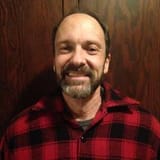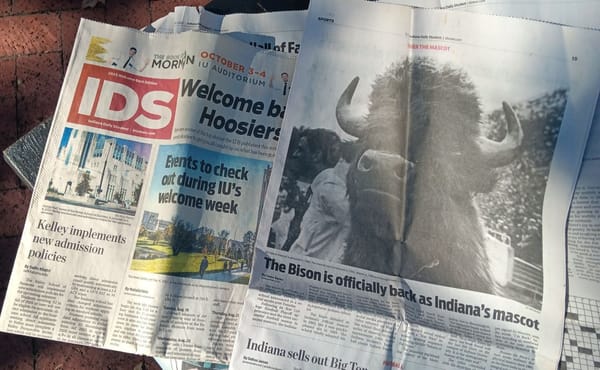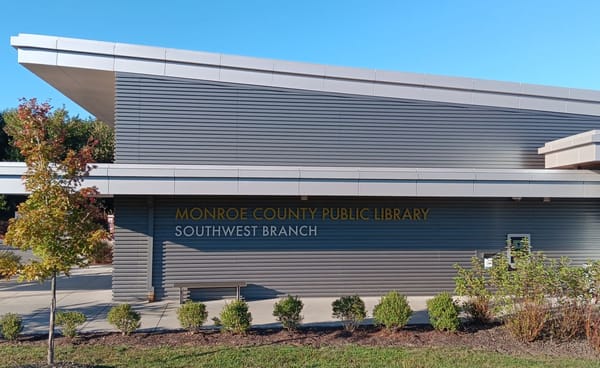Poet Chris Mattingly Explains How Vulnerability Is His Greatest Strength
In this interview recorded last summer, poet Chris Mattingly talks with Dave Torneo about how his poetry is informed by everything from a cult in California to “a freak culture” in Evansville. Also posted are poems from each of the Ledge Mule Press co-founders: Mattingly, Torneo, and Ross Gay. Click
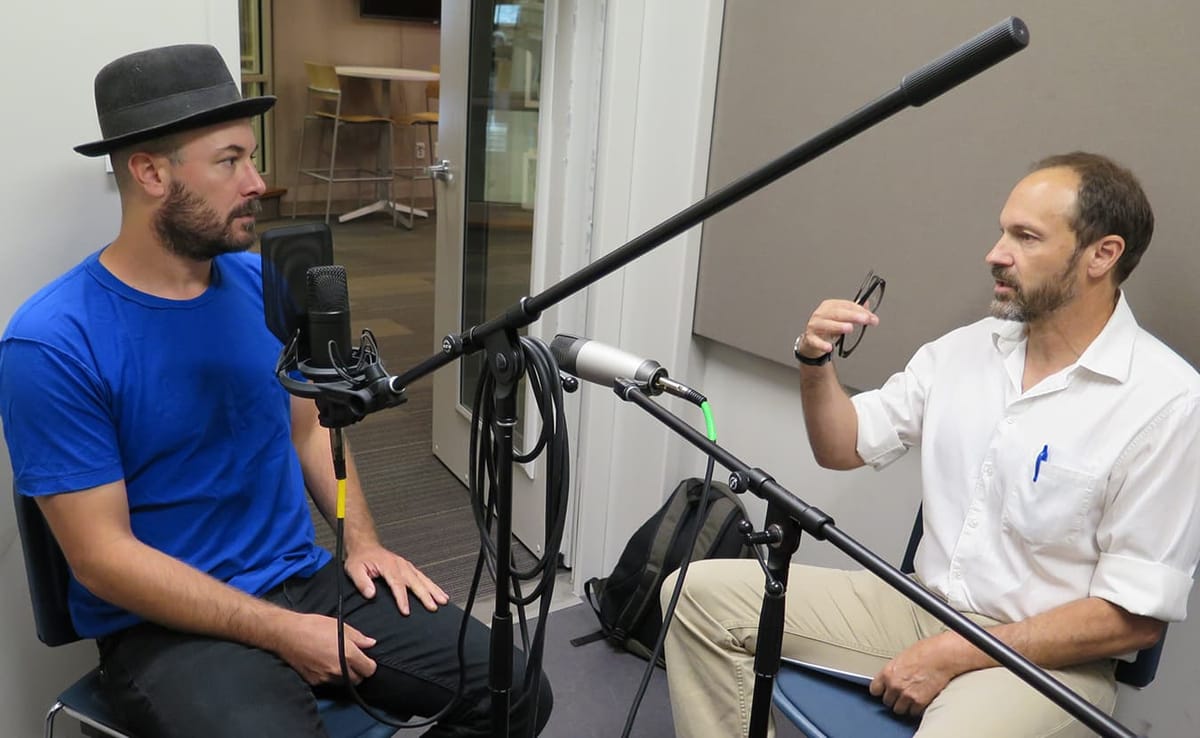
In this interview recorded and edited by J.D. Gray at the Monroe County Public Library’s Level Up studio, Chris Mattingly tells Dave Torneo about his journey to the poet’s life. Mattingly, who studied under Indiana University professor Ross Gay, reads several of his poems and describes some of his significant influences — from his father giving him “permission to be emotional, to be vulnerable, to be sensitive, and to be open” to joining a cult in Monterey, California, to returning to the “freak culture” in Evansville where he grew up.
Mattingly is the author of a full-length collection of poems, named Scuffletown (Typecast Publishing, 2013), as well as two chapbooks, Ad Hoc and A Light for Your Beacon (2010 and 2012, respectively, both from Q Avenue Press). His work has appeared in The Louisville Review, Sawmill, River Styx, and The Lumberyard. He graduated from Indiana University with a bachelor’s degree in English and folklore and has an MFA in poetry from Spalding University. He lives in Louisville.
***
Included below are poems from each of the Ledge Mule Press co-founders: Mattingly, Torneo, and Gay.
The Catalyst By Chris Mattingly
A long time ago I said, Fuck work. But I never gave up on walking. And so every day Rise before sun to lace up and cock the brim of my black trilby And do what the sad call nothing.
This summer, I’ve been walking the six miles down To Butchertown to sit under the bridge by the creek That runs beside the slaughterhouse.
I like to lay my head back against the sun-warmed limestone pilings And listen to the guttural squeals of pig Until I remember how I used to lie On the floor when I was fifteen—my head between The twelve inch subs of my mom’s floor speakers from ’77.
I think the idea was that if I played the Melvins loud enough, I could erase memory.
I think I was just waiting for that one curdling red feedback note To pour down like a river that really could carry me away.
________
The only other time I’ve felt at home was when I was actually there, In the mosh pit.
Once, at the Catalyst in Santa Cruz, I was swept under The pit by a rip tide of elbows and boots. I went limp and let it take me into the buck-and-tangled Swirling mash of bodies swarping into denim waves Of sweat and skutch.
Now, when I think about the crush of bodies, I see the wide bed Where you lie, little grrrl, with Laurel and I in a criss-cross slumber, The window open to night’s jet engine.
Sometimes you wake me with a heel in my chin, Or an elbow in my ribs, and I love it. And the way you writhe And twist to ride the wave of Mama’s breathing...
That, and I think about our walks along the river, You strapped to my back. After only a few miles, both Our shirts are soaked through. The heat between us so green, I think of humid Appalachian crevices: water trickling Down between limestone, ferns and lichen. I don’t know, but I like to think that there When you turn your reddened cheek into my shoulder, And your arms finally fall limp, when Your burning eye lids twitch, Your chest fills with air and your mouth opens like a waxing moon, That we are saying all that can be said between A father and daughter.
________
Today, the river is so placid I can stare until it turns Into the green Coke bottle vinyl spinning Under the dim light of a turntable.
The closer to the dam, the more like a lake this river becomes Until, finally, there, backed up against the dam, the tangled Lock and twist of limbs and trunks of driftwood. They rise out of the water like the antlers of some extinct thing...
After the show that night, I walked onto Pacific Avenue Wearing a polka dotted dress and combat boots, My fingernails painted like Fruit Loops.
I don’t want to make a big deal about it, But I was 2,000 miles from home with less than $2.
Looking for some squat to sleep In the stucco flats with my dress riding high Calls from the porch, the late corners, Shouting things I can’t repeat because I didn’t understand. Thinking, if I can just get to the beach, walking faster Like any girl on a dark street: aware of every time A man crosses the road, turns the corner, Picks up his clip...
That night I stood out on the railing of the train bridge And asked the one question we all must ask. The river sloshed and rocked into the tide. I could hear the surf Like a street sweeper circling the neighborhood. And from farther, thunderous bark of sea lions under the wharf.
The rain hit my back and I spread my arms Like a crow in a trash bag.
I remember thinking this is how everyone I’ve ever hurt Must’ve felt. And in that moment, With the neon lights of the boardwalk diffused across a gauzy sky, The silhouettes of palm trees, And plain, loud barking sea lions, I let go.
Dave Torneo
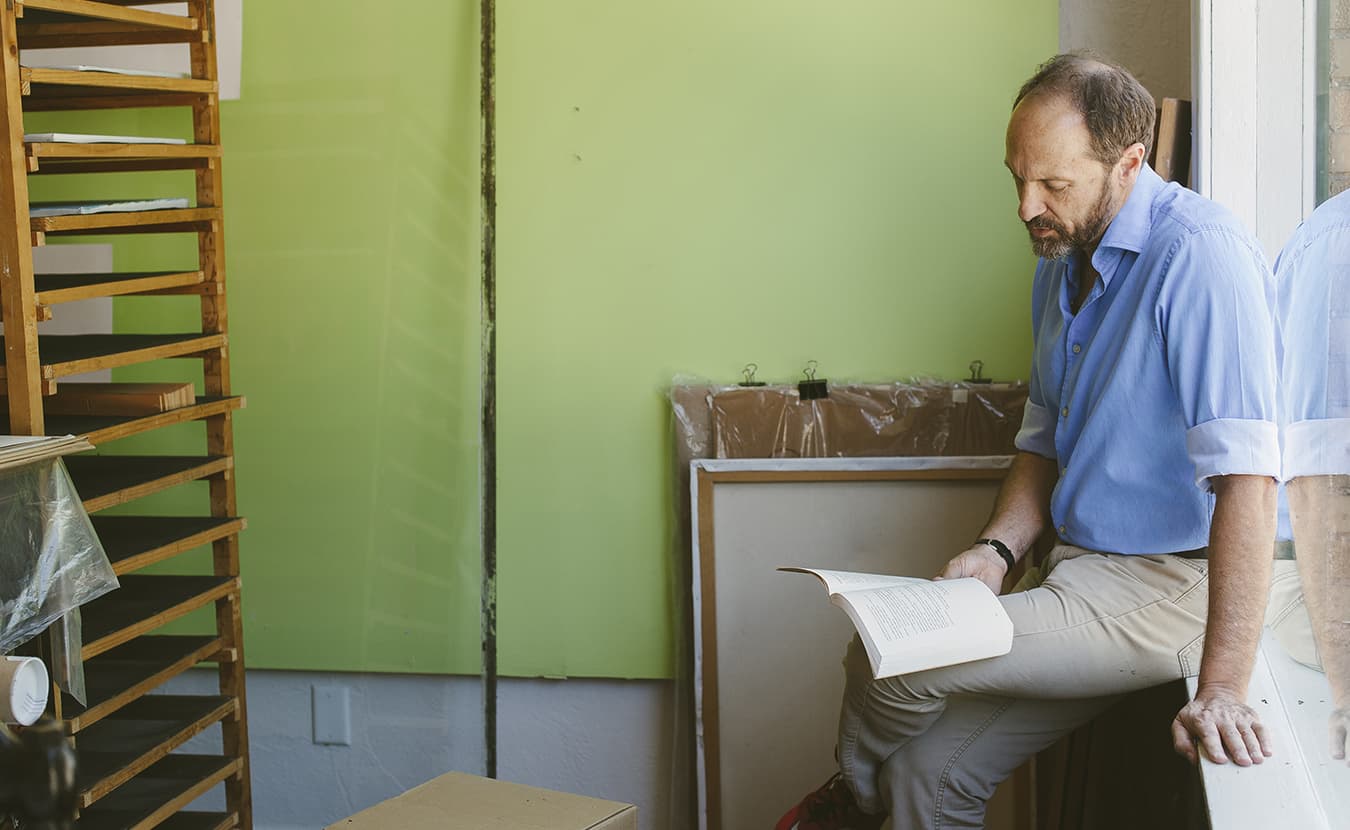
Dave Torneo’s poems have been published in Mudfish, The Café Review, Silverfish Review, Another Chicago Magazine, Asylum, and Big Scream. Born in Los Angeles, Torneo graduated from the University of California at Santa Barbara and spent time in upstate New York before moving to Bloomington in 1996. Besides championing local and regional poets by organizing readings, interviews, podcasts, book launches, and LP releases through the Ledge Mule Press Poetry Project, Torneo is “an all-around artist,” says Gay. Read more about him in this profile: “David Torneo: Bloomington’s Ambassador of Poetry.”
He’s 15
and we’re driving from Bloomington, Indiana on Interstate 65 to some infernal suburb west of Chicago where he’ll be prime meat for a few days as coaches from tony campuses lure kids into enormous debt. I can’t touch a single dream as he dozes folded in his bucket seat— not the sisters of mercy calling to him from a 2am red-light walkup, or the dominatrix in spit-shined jackboots demanding he bark like a dog; I can’t protect him from the KGB or the local sheriff stoned on meth or the errant drone or the bogey man. He’s 15. I’m too old and lost in my own lagging hard-on driven lusts to know what drives him crazy, but I can guess. Are all fathers voyeurs hoping to glimpse a son’s backseat humpfests? Or is that just me caught in a tangle of affection and fear?
I’ve got Coltrane on the CD player to ease me through one form of pain to another— Central Park West and then Naima—over and over; just by pushing a button I enter that lonely heartbreak. He’s 15 and I want to wake him to those phrases, what the poet Pat Rosal calls a gorgeous groan, somehow insinuate sheets of sound, the attendant lush sweetness and emblems of bitterness into his brain like an inoculating serum.
Because I still believe the actual world is antidote to what ails us, I want to wake him to all this as we travel on past collapsed barns, honey locusts turned to dry cross-hatchings, scrawny rabbits shivering in the stubble, hawks hovering, eyeing the skimpy pickings of February, father and son on a road trip, but I resist the dream-ending nudge.
A New England poet clearly with winter locked in his heart said our sons are our executioners. I say no, more like our saviors, umbilical cord a thrumming lifeline, live wire linking us to days we could dunk a basketball, or at least nick a bent schoolyard rim with a finger tip. No wonder I hesitated to snip him loose into free fall. Would it hurt him? Of course it would! Even after all this, face bruised, smeared with his mother’s blood, there would be more blood.
He’s 15, snores through an open mouth traced with nascent pencil-thin stache, a little funk rises off his lank body, and I ache because I’m stuck in a constant state of nostalgia for his long gone babyhood.
Should I tell him by pure chance alone I avoided a father’s fists and steel-tipped boot, that a swarm of rats never drifted like a skittering fog into my crib to carry me to a new home in a sewer? My path was clear so I could imagine myself the hip-guru-father. Better to count up all the days I’ve fallen over phantom trip-wire, better to be still, behold, and keep quiet.
He’s 15. I hope his dreams are moist with honeysuckle vapor rising from an August garden. I hope he still confuses the dreamer with the dream, moves along that safe terrain free of the father’s tyranny, the father’s losses.
Ross Gay
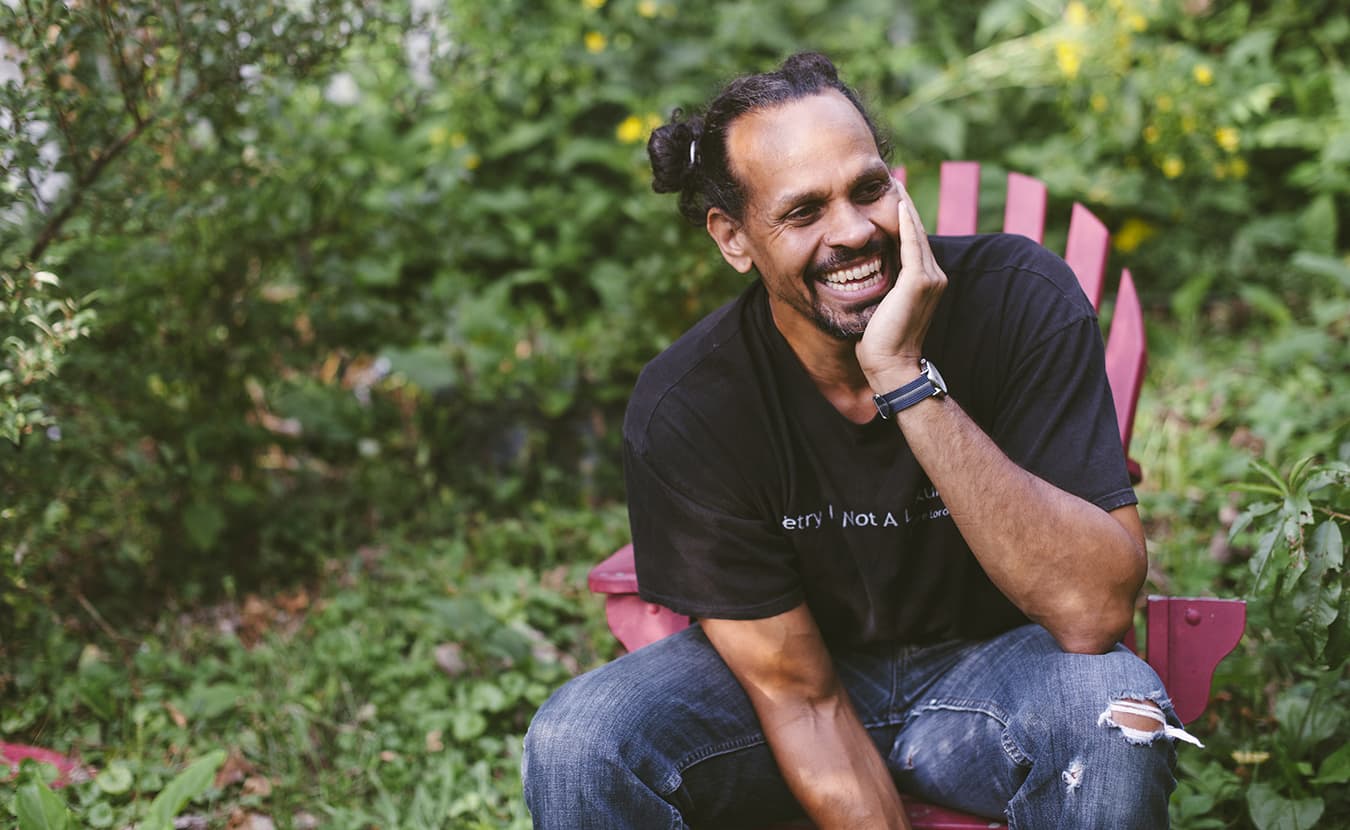
Ross Gay grew up in Levittown, Pennsylvania, and earned a Ph.D. in English at Temple University. An IU professor who has been awarded a fellowship for the 2015–2016 academic year by Harvard University’s Radcliffe Institute for Advanced Study, his book of poetry Catalog of Unabashed Gratitude (University of Pittsburgh Press, 2015) was selected this year by the National Book Foundation as a Finalist for the National Book Award.
Gay is the author of two other collections of poetry, Against Which (CavanKerry Press, 2006) and Bringing the Shovel Down (University of Pittsburgh Press, 2011), and he co-wrote Lace & Pyrite: Letters from Two Gardens (Organic Weapon Arts, 2014) with Aimee Nezhukumatathil.
In this profile, “Book by Local Poet Ross Gay Selected as Finalist for the National Book Award,” Gay reflects on his work, his relationships with other poets, and on the influence Bloomington has had on his poetry.
Holy Shit!
Holy shit it’s boring I mostly think all dusty webs shivering (even the spiders cough!) the dictive felicities and dumb lock-step thudaroo the brainy lingual balletics the ghastly tabernacles the inspections of the lint in our minds’ navels a goddamned snooze-fest we in our hum-drum kill-me-already reading voices and the rickety pages and white horses with bows in their manes we licking the mausoleum-keepers’ boots the grave sweepers their finely-woven brooms such a weird little party ours all dust-motes and bow-ties and flaking atlases all endowed chairs and martinis and houses with barbed wire fences god forbid the lusty jungle of your tongue god forbid you shit 84 minutes ago and the toilet paper broke god forbid the snaggle of spinach between your teeth your limp the animal face you make when you come with friends or alone the rivulet of sweat behind your ear or the funk there god forbid you are actually dying this second the ants are licking their lips despite the ghastly shine we paint on everything I think let me give this up this stupid goop trade it for a six-pack or pick-axe for anything until the kid makes his way to the mic with his glasses just cocked and pulls from his pocket a poem and unfolding it tears it slightly while the second hand bangs through the air and his face twitches the least bit as he looks toward us squinting for he is blinded and he swallows and moves toward the mic and his hands shake and the poem in his hands shakes and we with him shake too
***
Ode to the Flute By Ross Gay
A man sings by opening his mouth a man sings by opening his lungs by turning himself into air a flute can be made of a man nothing is explained a flute lays on its side and prays a wind might enter it and make of it at least a small final song
“Ode to the Flute” from Catalog of Unabashed Gratitude, by Ross Gay, © 2015. All rights are controlled by the University of Pittsburgh Press, Pittsburgh, PA 15260. Used by permission of the university of Pittsburgh Press.

